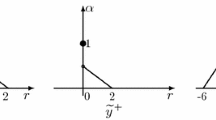Abstract
The weak and strong duality theorems in fuzzy optimization problem based on the formulation of Wolfe’s primal and dual pair problems are derived in this paper. The solution concepts of primal and dual problems are inspired by the nondominated solution concept employed in multiobjective programming problems, since the ordering among the fuzzy numbers introduced in this paper is a partial ordering. In order to consider the differentiation of a fuzzy-valued function, we invoke the Hausdorff metric to define the distance between two fuzzy numbers and the Hukuhara difference to define the difference of two fuzzy numbers. Under these settings, the Wolfe’s dual problem can be formulated by considering the gradients of differentiable fuzzy- valued functions. The concept of having no duality gap in weak and strong sense are also introduced, and the strong duality theorems in weak and strong sense are then derived naturally.
Similar content being viewed by others
Explore related subjects
Discover the latest articles, news and stories from top researchers in related subjects.References
Apostol T.M. (1974). Mathematical analysis (2nd ed). New York, Addison-Wesley Publishing Company
Banks H.T., Jacobs M.Q. (1970). A differential calculus for multifunctions. Journal of Mathematical Analysis and Applications 29, 246–272
Bazarra M.S., Sherali H.D., Shetty C.M. (1993). Nonlinear programming. New York, Wiley
Bector C.R., Chandra S. (2002). On duality in linear programming under fuzzy environment. Fuzzy Sets and Systems 125, 317–325
Bector C.R., Chandra S., Vijay V. (2004a). Duality in linear programming with fuzzy parameters and matrix games with fuzzy pay-offs. Fuzzy Sets and Systems 146, 253–269
Bector C.R., Chandra S., Vidyottama V. (2004b). matrix games with fuzzy goals and fuzzy linear programming duality. Fuzzy Optimization and Decision Making 3, 255–269
Liu Y., Shi Y., Liu Y.-H. (1995). Duality of fuzzy MC 2 linear programming: A constructive approach. Journal of Mathematical Analysis and Applications 194, 389–413
Ramík J. (2005). Duality in fuzzy linear programming: Some new concepts and results. Fuzzy Optimization and Decision Making 4, 25–39
Richardt J., Karl F., Müller C. (1998). Connections between fuzzy theory, simulated annealing, and convex duality. Fuzzy Sets and Systems 96, 307–334
Rodder, W., & Zimmermann, H.-J. (1977). Duality in fuzzy linear programming. Internat. Symp. on Extremal Methods and Systems Analysis, University of Texas at Austin, pp. 415–427.
Sakawa M., Yano H. (1994). A fuzzy dual decomposition method for large-scale multiobjective nonlinear programming problems. Fuzzy Sets and Systems 67, 19–27
Verdegay J.L. (1984). A dual approach to solve the fuzzy linear programming problems. Fuzzy Sets and Systems 14, 131–141
Wolfe P. (1961). A duality theorem for nonlinear programming. Quarterly of Applied Mathematics 19, 239–244
Wu H.-C. (2003a). Duality theory in fuzzy linear programming problems with fuzzy coefficients. Fuzzy Optimization and Decision Making 2, 61–73
Wu H.-C. (2003b). Duality theorems in fuzzy mathematical programming problems based on the concept of necessity. Fuzzy Sets and Systems 139, 363–377
Wu H.-C. (2004). Duality theory in fuzzy optimization problems. Fuzzy Optimization and Decision Making 3, 345–365
Zadeh L.A. (1965). Fuzzy Sets. Information and Control 8, 338–353
Zadeh L.A. (1975a). The concept of linguistic variable and its application to approximate reasoning I. Information Sciences 8, 199–249
Zadeh L.A. (1975b). The concept of linguistic variable and its application to approximate reasoning II. Information Sciences 8, 301–357
Zadeh L.A. (1975c). The concept of linguistic variable and its application to approximate reasoning III. Information Sciences 9, 43–80
Zhang C., Yuan X.-H., Lee E.S. (2005). Duality theory in fuzzy mathematical programming problems with fuzzy coefficients. Computers and Mathematics with Applications 49, 1709–1730
Author information
Authors and Affiliations
Corresponding author
Rights and permissions
About this article
Cite this article
Wu, HC. Duality theory in fuzzy optimization problems formulated by the Wolfe’s primal and dual pair. Fuzzy Optim Decis Making 6, 179–198 (2007). https://doi.org/10.1007/s10700-007-9014-x
Published:
Issue Date:
DOI: https://doi.org/10.1007/s10700-007-9014-x




